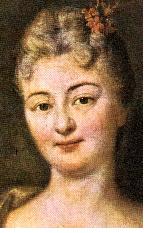Louise-Éléonore de la Tour du Pil, baronne de (baroness of) Warens
Swiss aristocrat of intelligence, independence and energy, b. 1700 (Vevey, Switzerland), d. 1762 (Chambéry, Savoy).
 Louise-Éléanore de la Tour was the daughter of Jean-Baptiste de la Tour and Jeanne Louise Warnéry, who died at the birth of her second daughter when Louise-Éléanore was one year old. Her father married again when she turned six but died five years later. The education of the young girl was then in the hands of her step-mother, who sent her to a boarding school in Lausanne.
Louise-Éléanore de la Tour was the daughter of Jean-Baptiste de la Tour and Jeanne Louise Warnéry, who died at the birth of her second daughter when Louise-Éléanore was one year old. Her father married again when she turned six but died five years later. The education of the young girl was then in the hands of her step-mother, who sent her to a boarding school in Lausanne.
At the boarding school Louise-Éléanore became an accomplished musician and singer. But her time of formal education was short; at the age of 14 she married Monsieur de Vuarens, a young military officer, and settled with him in Vevey.
The position of an officer's wife did not satisfy Madame de Warens' intellectual capabilities and ambitions. She set up a silk stocking and bedding factory; when the enterprise failed she decided to try her luck elsewhere. In 1726 she left Vevey in the dark of the night, taking with her the estate's silverware, crockery, linen, jewellery, the factory cash, most of the factory's stock, and the son of the estate's gardener.
In 18th century Europe a woman who wanted to have control over her life needed the protection of a public person to maintain her independence. Madame de Warens decided to turn to the king of Savoy, Victor Amadeus II. But the king would only contemplate assisting people of the Catholic faith, so she converted to catholicism.
The king bestowed an annual pension of 1500 pounds on her, to which the bishops of Annecy and Maurienne added their own financial support. In return, Baronesse de Warens, who had meanwhile divorced her husband, had to look after the new, mostly male and young converts to the faith and give them accommodation in her new grand home.
One of Baronesse de Warens' lovers was Jean-Jacques Rousseau. Because Rousseau owed his musical and philosophical education to her, future centuries associate de Warens' name invariably with the name of this great philosopher. But she was a woman of stature in her own right, with wide interests in philosophy, physics, medicine and chemistry, which led her to produce her own ointments, medicines and fabric dyes. There can be little doubt that under more favourable circumstances she would have contributed much more to society.
Rousseau admired Baronesse de Warens greatly but could never quite get over his protestant upbringing and therefore suffered when he watched her lifestyle. This influenced the picture he painted of her in his autobiography "Confessions". The publication of Confessions in 1753 prompted the Savoyan general Amédée Doppet to redress the balance by writing, under a pseudonym, the Mémoires de Madame de Warens (Memoirs of Madame de Warens).
home
 Louise-Éléanore de la Tour was the daughter of Jean-Baptiste de la Tour and Jeanne Louise Warnéry, who died at the birth of her second daughter when Louise-Éléanore was one year old. Her father married again when she turned six but died five years later. The education of the young girl was then in the hands of her step-mother, who sent her to a boarding school in Lausanne.
Louise-Éléanore de la Tour was the daughter of Jean-Baptiste de la Tour and Jeanne Louise Warnéry, who died at the birth of her second daughter when Louise-Éléanore was one year old. Her father married again when she turned six but died five years later. The education of the young girl was then in the hands of her step-mother, who sent her to a boarding school in Lausanne.